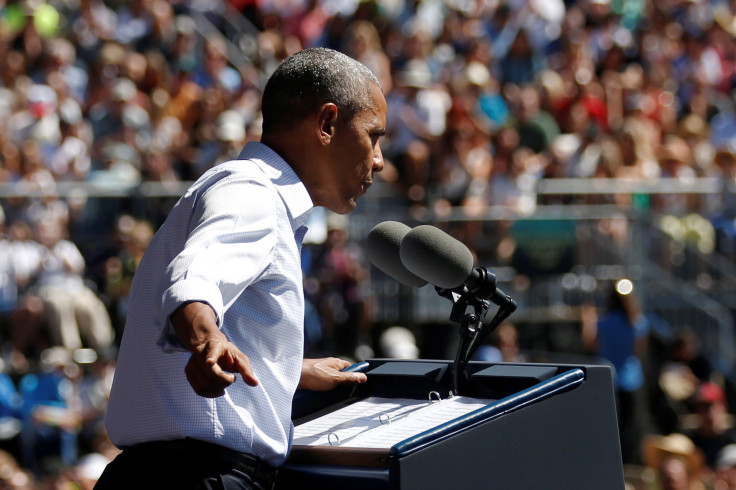What Is The Clean Power Plan? A Florida Mayor Worried About Flooding Explains Obama Court Battle

In southern Florida it doesn’t even have to rain these days for the streets to flood.
Rising sea levels caused by global climate change means that water from storm drains or the nearby ocean regularly cover cities. The wet stuff puts a strain on the septic tanks in Pinecreast -- one community down there -- putting the city at continual risk of public health crises and infrastructure damages to homes and businesses. In nearby Miami Beach, tidal flooding has caused the city to implement a $400 million plan to make sure they can pump water out.
For these reasons, Democratic Pinecrest Mayor Cindy Lerner has made a point of pushing for greater environmental protections to mitigate climate change. This week, she traveled to Washington, D.C., ahead of oral arguments Tuesday in the U.S. Court of Appeals for the D.C. Circuit on President Barack Obama’s Clean Power Plan, which would require cuts to carbon emissions from power plants — a main contributor to climate change — in the country.
The plan was announced by the Obama administration in August 2015 and quickly became divisive. The executive order — which would require coal-fired plants to reduce emissions by 32 percent below 2005 levels by 2030 — was generally praised by Democrats and hailed as the president's most significant climate policy. Republicans, however, argued that the regulations would hurt American businesses.
It was temporarily blocked in February by the Supreme Court without explanation. Twenty-four states are suing the Environmental Protection Agency, including Texas, Alabama, New Jersey and West Virginia. In addition to those states, utilities and coal companies are opposing the plan in court as part of the effort before the court Tuesday.
The International Business Times caught up with Lerner by phone Monday to discuss what the Clean Power Plan means for Florida and the nation:
Why Is The Clean Power Plan So Important To You And Pinecrest?
We are ground zero for adverse impacts. We’re living those impacts now. And, I think it’s critically important because of what is going on all over the country – it’s not just South Florida. It’s not just coastal cities. It is extreme weather events all over the country.
As an elected official, I feel a responsibility and obligation to recognize risks that we need to respond to to protect our homes and our businesses, our infrastructure and our roads. In addition, I think it’s a responsibility to plan for the future. So, our building codes and our land use codes and the way we allow for others to build. It’s part of the planning process to make sure that we are reducing adverse impacts.
I see the big picture. I see how critical it is that we obligate ourselves at every level of government from the federal government on down. And the most obvious place to start that at is the federal level is at the power plants.
What Are You Doing To Adapt?
Being at sea level, we have the impacts of not only sea level rise and storm surge but the rising water table. Florida’s built on limestone. The water is coming up through the ground it’s coming up through our storm water drains when we have high tides. We are faced with – many of us in South Florida are on septic tanks. That’s a huge public health risks to have to address when the water table comes up. We have septic tanks that will all be destroyed. We don’t have sewer systems.
Access to drinking water is another issue; agriculture is a huge part of our economy. The most recent problem is what’s happening with mosquito borne diseases and Zika.
All of these things are getting worse when we see what carbon emissions are doing and how the impact of these carbon emissions is much more aggressive than it was initially thought. We all have to take responsibility.
There are wonderful things that we can do at the city level and at the county level and those are because we have the control over our budgets and our commitments but it’s incremental compared to what the federal government has to do.
Obama’s Legacy Is On The Line This Year: What About The Presidential Candidates And The 2016 Race In General?
When I went to New Hampshire this winter [to question Republican presidential candidates on climate issues during the primary] I went specifically to have a face-to -face conversation with our native sons – former Gov. Jeb Bush and Sen. Marco Rubio — because I know they know better and that being a climate denier was truly a political position to take because their supporters and donors come from the fossil fuel industry.
Marco Rubio was absurd in his response and he continues the same denial. Jeb Bush was better. Jeb Bush actually acknowledged that climate change was man made.
I’m very, very happy to know that former Secretary of State Hillary Clinton has a climate action agenda. I'm happy that she has a plan, that she’s putting together a transition team and that there will be continuity and hopefully even more aggressive progress being made in her administration. So, what’s the other option with the Republican nominee? It’s another Marco Rubio: full beholden to ignorance.
This interview has been edited for length and clarity.
CORRECTION: The original version of this story incorrectly reported Pinecrest experiences tidal flooding regularly. Nearby Miami Beach is where flooding has been taking place. The text of this story has been updated to reflect this correction.
© Copyright IBTimes 2025. All rights reserved.






















